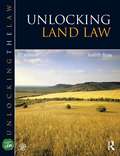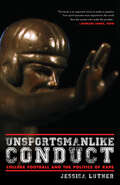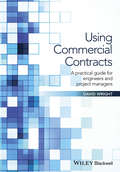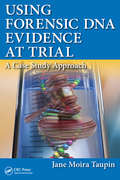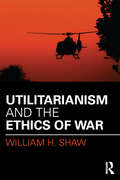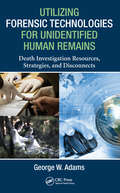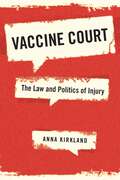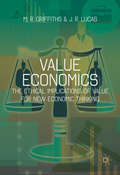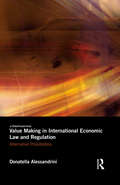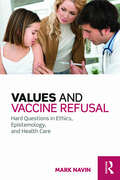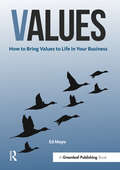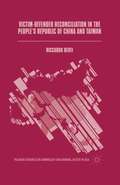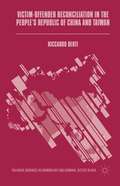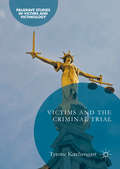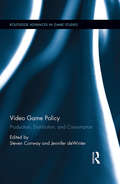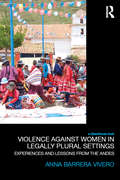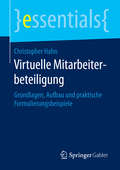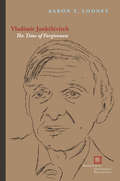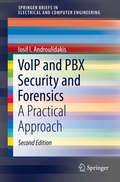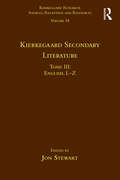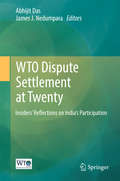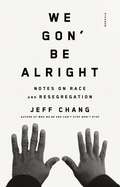- Table View
- List View
Unlocking Land Law (Unlocking the Law)
by Judith BrayUnlocking Land Law will help you grasp the main concepts of the subject with ease. Containing accessible explanations in clear and precise terms that are easy to understand, it provides an excellent foundation for learning and revising Land Law. The information is clearly presented in a logical structure and the following features support learning helping you to advance with confidence: Clear learning outcomes at the beginning of each chapter set out the skills and knowledge you will need to get to grips with the subject Key Facts summaries throughout each chapter allow you to progressively build and consolidate your understanding End-of-chapter summaries provide a useful check-list for each topic Cases and judgments are highlighted to help you find them and add them to your notes quickly Frequent activities and self-test questions are included so you can put your knowledge into practice Sample essay questions with annotated answers prepare you for assessment Glossary of legal terms clarifies important definitions This edition has been extensively rewritten and updated to include discussion of recent changes and developments within the module, including the issues arising from the decisions in Swift v 1st Ltd v Chief Land Registrar and Scott v Southern Pacific Mortgages Ltd and their implications in registered land cases. It also reviews the law of implied trusts post Stack v Dowden and Jones v Kernott . The books in the Unlocking the Law Series get straight to the point and offer clear and concise coverage of the law, broken-down into bite-size sections with regular recaps to boost your confidence. They provide complete coverage of both core and popular optional law modules, presented in an innovative, visual format. Visit www.unlockingthelaw.co.uk for access to free study resources, including multiple choice questions, key questions and answers, revision mp3s and cases and materials exercises.
Unsportsmanlike Conduct: College Football and the Politics of Rape
by Jessica LutherA meticulously researched and powerful exposé on the epidemic of cover-up that surrounds sexual assault and college football players.“Not to reckon with Luther’s book would be an abdication not only of one’s moral faculty but also of one’s fandom . . . Luther doesn’t just want to save future victims; she wants to save college football.” —New York Times Book Review“Highly relevant, hard-hitting, much-needed information that reveals the widespread existence of rape by sports players on college campuses.” —Kirkus ReviewsFootball teams create playbooks, in which they draw up the plays they will use on the field. Playbooks are how teams work and why they win. This book is about a different kind of playbook: the one coaches, teams, universities, police, communities, the media, and fans seem to follow whenever a college football player is accused of sexual assault. It’s a deep dive into how different institutions—the NCAA, athletic departments, universities, the media—run the same plays over and over again when these stories break. If everyone runs his play well, scrutiny dies down quickly, no institution ever has to change how it operates, and the evaporation of these cases into nothingness looks natural. In short, this playbook is why nothing ever changes.Unsportsmanlike Conduct unpacks this societal playbook piece by piece, and not only advocates that we destroy the old plays, but also suggests we replace them with ones that will force us to finally do something about this issue.Political sportswriter and Edge of Sports imprint curator Dave Zirin (the Nation) has never shied away from criticizing that which die-hard sports fans hold dear. The Edge of Sports titles will address issues across many different sports—football, basketball, swimming, tennis, etc.—and at both the professional and nonprofessional/collegiate levels. Furthermore, Zirin brings to the table select stories of athletes’ journeys and what they are facing and how they evolve both in their sport as well as against the greater backdrop of one’s life’s odyssey.
Using Commercial Contracts: A Practical Guide for Engineers and Project Managers
by David WrightUsing Commercial Contracts: a practical guide for engineers and project managers examines how the law of contract operates, and the way in which the legal system interprets what a contract actually means. By giving clear, readable and expert advice on key legal issues, this guide provides the manager and engineer with an easily understandable and practical approach to the laws of contract.
Using Forensic DNA Evidence at Trial: A Case Study Approach
by Jane Moira TaupinUsing Forensic DNA Evidence at Trial: A Case Study Approach covers the most common DNA analysis methods used in criminal trials today, including STR techniques, mitochondrial DNA, and Y-STRs. It presents some novel techniques—including familial testing and analyzing domestic animal hair—that have been recently introduced in unique cases, each of which is outlined in detail. It also illustrates special issues related to forensic DNA evidence by using court proceedings such as trials and appeals, commissions of inquiry, and government and laboratory reviews. With forensic DNA analysis becoming increasingly important at trial, the lively and sometimes bizarre cases presented in this book have been carefully chosen to highlight specific concepts, methods, and interpretations used in DNA analysis. Sections throughout examine the nature of expertise with a special focus on the role of subjectivity in the interpretation of forensic DNA evidence, emphasizing cognitive bias and extraneous context. Using both convictions and exonerations as examples, the book also discusses the strengths and limitations of DNA evidence and testing. The book is written in an accessible manner for the non-scientific reader, such that criminal lawyers, judges, and forensic experts will all understand the nature of analysis and application of DNA evidence in a variety of court cases. Extensive references—including notable trial proceedings, cross references of cases, and specific forensic statistics—round out the book and help to provide a complete understanding of forensic DNA analysis and its current usage in the courtroom.
Utilitarianism and the Ethics of War (War, Conflict and Ethics)
by William H. ShawThis book offers a detailed utilitarian analysis of the ethical issues involved in war. Utilitarianism and the Ethics of War addresses the two basic ethical questions posed by war: when, if ever, are we morally justified in waging war, and if recourse to arms is warranted, how are we permitted to fight the wars we wage? In addition, it deals with the challenge that realism and relativism raise for the ethical discussion of war, and with the duties of military personnel and the moral challenges they can face. In tackling these matters, the book covers a wide range of topics—from pacifism to armed humanitarian intervention, from the right of national defense to pre-emptive or preventive war, from civilian immunity to the tenets of just war theory and the moral underpinnings of the rules of war. But, what is distinctive about this book is that it provides a consistent and thorough-going utilitarian or consequentialist treatment of the fundamental normative issues that war occasions. Although it goes against the tide of recent work in the field, a utilitarian approach to the ethics of war illuminates old questions in new ways by showing how a concern for well-being and the consequences of our actions and policies shape the moral constraints to which states and other actors must adhere. This book will be of much interest to students of the ethics of war, just war theory, moral philosophy, war and conflict studies and IR.
Utilizing Forensic Technologies for Unidentified Human Remains: Death Investigation Resources, Strategies, and Disconnects
by George W. AdamsIn missing and unidentified investigations, an abyss of dissonance seems to exist between law enforcement and the community they serve that all too often creates grating wounds that may never heal. Utilizing Forensic Technologies for Unidentified Human Remains: Death Investigation Resources, Strategies, and Disconnects bridges this abyss.This is th
Vaccine Court: The Law and Politics of Injury
by Anna KirklandA behind-the-scenes examination of the special court dedicated to claims that vaccines have caused harmThe so-called vaccine court is a small special court in the United States Court of Federal Claims that handles controversial claims that a vaccine has harmed someone. While vaccines in general are extremely safe and effective, some people still suffer severe vaccine reactions and bring their claims to vaccine court. In this court, lawyers, activists, judges, doctors, and scientists come together, sometimes arguing bitterly, trying to figure out whether a vaccine really caused a person’s medical problem. In Vaccine Court, Anna Kirkland draws on the trials of the vaccine court to explore how legal institutions resolve complex scientific questions. What are vaccine injuries, and how do we come to recognize them? What does it mean to transform these questions into a legal problem and funnel them through a special national vaccine court, as we do in the US? What does justice require for vaccine injury claims, and how can we deliver it? These are highly contested questions, and the terms in which they have been debated over the last forty years are highly revealing of deeper fissures in our society over motherhood, community, health, harm, and trust in authority. While many scholars argue that it’s foolish to let judges and lawyers decide medical claims about vaccines, Kirkland argues that our political and legal response to vaccine injury claims shows how well legal institutions can handle specialized scientific matters. Vaccine Court is an accessible and thorough account of what the vaccine court is, why we have it, and what it does.
Value Economics
by M. R. Griffiths J. R. LucasThe last financial crisis revealed a gap between business practice and ethics. In Value Economics, Griffiths and Lucas examine some of the reasons for this ethical gap and discuss the resulting loss of confidence in the financial system. One of the reasons has been hazy or inadequate thinking about how we value economic enterprises. With the close link between the creation of value and business ethics in mind, this book proposes that economic value should become the basic metric for evaluating performance in the creation of value, and for establishing fair and reasonable standards for executive compensation. Value Economics considers a number of rational philosophical principles for business management, on which practical codes of business ethics can be based. As the creation of value has moral implications for economic justice, the book reaffirms the argument for economics as a moral science, and seeks, within the context of proposed changes in the regulation and control of financial services, to answer the following question: will things really change after the last financial crisis?
Value Economics: The Ethical Implications of Value for New Economic Thinking
by M. R. Griffiths J. R. LucasThe last financial crisis revealed a gap between business practice and ethics. In Value Economics, Griffiths and Lucas examine some of the reasons for this ethical gap and discuss the resulting loss of confidence in the financial system. One of the reasons has been hazy or inadequate thinking about how we value economic enterprises. With the close link between the creation of value and business ethics in mind, this book proposes that economic value should become the basic metric for evaluating performance in the creation of value, and for establishing fair and reasonable standards for executive compensation. Value Economics considers a number of rational philosophical principles for business management, on which practical codes of business ethics can be based. As the creation of value has moral implications for economic justice, the book reaffirms the argument for economics as a moral science, and seeks, within the context of proposed changes in the regulation and control of financial services, to answer the following question: will things really change after the last financial crisis?
Value Making in International Economic Law and Regulation: Alternative Possibilities
by Donatella AlessandriniThis book examines the contemporary production of economic value in today’s financial economies. Much of the regulatory response to the global financial crisis has been based on the assumption that curbing the speculative ‘excesses’ of the financial sphere is a necessary and sufficient condition for restoring a healthy economic system, endowed with real values, as distinct from those produced by financial markets. How, though, can the ‘intrinsic’ value of goods and services produced in the sphere of the so-called real economy be disentangled from the ‘artificial’ value engineered within the financial sphere? Examining current projects of international legal regulation, this book questions the regulation of the financial sphere insofar as its excesses are juxtaposed to some notion of economic normality. Given the problem of neatly distinguishing these domains – and so, more generally, between economy and society, and production and social reproduction – it considers the limits of our current conceptualization of value production and measurement, with specific reference to arrangements in the areas of finance, trade and labour. Drawing on a range of innovative work in the social sciences, and attentive to the spatial and temporal connections that make the global economy, as well as the racial, gender and class articulations of the social reproductive field within it, it further asks: what alternative arrangements might be able to affect, and indeed alter, the value-making processes that underlie our current international regulatory framework?
Values and Vaccine Refusal: Hard Questions in Ethics, Epistemology, and Health Care
by Mark NavinParents in the US and other societies are increasingly refusing to vaccinate their children, even though popular anti-vaccine myths – e.g. ‘vaccines cause autism’ – have been debunked. This book explains the epistemic and moral failures that lead some parents to refuse to vaccinate their children. First, some parents have good reasons not to defer to the expertise of physicians, and to rely instead upon their own judgments about how to care for their children. Unfortunately, epistemic self-reliance systematically distorts beliefs in areas of inquiry in which expertise is required (like vaccine immunology). Second, vaccine refusers and mainstream medical authorities are often committed to different values surrounding health and safety. For example, while vaccine advocates stress that vaccines have low rates of serious complications, vaccine refusers often resist vaccination because it is ‘unnatural’ and because they view vaccine-preventable diseases as a ‘natural’ part of childhood. Finally, parents who refuse vaccines rightly resist the utilitarian moral arguments – ‘for the greater good’ – that vaccine advocates sometimes make. Unfortunately, vaccine refusers also sometimes embrace a pernicious hyper-individualism that sanctions free-riding on herd immunity and that cultivates indifference to the interpersonal and social harms that unvaccinated persons may cause.
Values: How to Bring Values to Life in Your Business
by Ed MayoWhat matters to us? One way of answering that question is through the lens of values, which have a powerful influence on our attitudes and behaviours. Yet it can be difficult for businesses to realize the true potential of values, which is to engage staff, customers and suppliers in an emotional way that touches on their own core motivations. Drawing on a range of case studies worldwide, including “profit with purpose” businesses such as co-operatives, this short guide reveals how to make a success of values. By unpacking what we mean by values and ethics, and setting out a series of practical approaches, Ed Mayo presents how values can become a natural part of commercial life. This book identifies both the pitfalls and the potential of bringing values into the heart of an organization, from a bank that responds to an ethical crisis to a fast-growing worker co-operative founded on the values of equality. The values that guide your business are not necessarily the ones that are written down, or that you would expect. There is no one right or wrong set of values, but there is power and potential in making the most of the values that are right for the business you are in. By reading Values: How to Bring Values to Life in Your Business, you will find out more about the business that you are, and the business that you could be.
Victim-Offender Reconciliation in the People's Republic of China and Taiwan (Palgrave Advances in Criminology and Criminal Justice in Asia)
by Riccardo BertiThis book examines the conciliatory institutions that operate within criminal law in the People's Republic of China and Taiwan. Despite having the same legal traditions, the two countries have taken very different political and social roads over the past century. Taking these important factors into account, the book compares the conciliatory mechanisms that have emerged in the two countries, particularly focusing on the influence of Confucian tradition in current criminal reconciliation practices. By drawing upon in-depth interviews with multiple experts in the area, the role of tradition in the discipline of modern Xingshi Hejie is explored, alongside an analysis of the reasons that lead victims and offenders to choose this conciliatory procedure. The book offers a fascinating account of this feature of criminal justice in China and Taiwan, and will be of particular interest to scholars interested in comparative approaches to criminology and criminal justice.
Victim-Offender Reconciliation in the People’s Republic of China and Taiwan (Palgrave Advances in Criminology and Criminal Justice in Asia)
by Riccardo BertiVictim-Offender Reconciliation in the People’s Republic of China and Taiwan
Victims and the Criminal Trial
by Tyrone KirchengastThis book addresses the idea that victims remain contested and controversial participants of justice in the twenty-first century adversarial criminal trial. Victims are increasingly participating in all phases of the criminal trial, with new substantive and procedural rights, many of which may be enforced against the state or defendant. This movement to substantive rights has been contentious, and evidences a contested terrain between lawyers, defendants, policy-makers and even victims themselves. Bringing together substantial source materials from law and policy, this book sets out the rights and powers of the victim throughout the phases of the modern adversarial criminal trial. It examines the role of the victim in pre-trial processes, alternative pathways and restorative intervention, the jury trial, sentencing, appeal and parole. Preventative detention, victim registers, criminal injuries compensation and victim assistance, restitution and reparations, and extra-curial rights and declarations are examined to set out the rights of victims as they impact upon and constitute aspects of the modern criminal trial process. The adversarial criminal trial is also assessed in the context of the increased rights of victims in international law and procedure, and with reference to policy transfer between civil and common law jurisdictions. This timely and comprehensive book will be of great interest to scholars of criminology, criminal law and socio-legal studies.
Video Game Policy: Production, Distribution, and Consumption (Routledge Advances in Game Studies)
by Steven Conway and Jennifer deWinterThis book analyzes the effect of policy on the digital game complex: government, industry, corporations, distributors, players, and the like. Contributors argue that digital games are not created nor consumed outside of the complex power relationships that dictate the full production and distribution cycles, and that we need to consider those relationships in order to effectively "read" and analyze digital games. Through examining a selection of policies, e.g. the Australian government’s refusal (until recently) to allow an R18 rating for digital games, Blizzard’s policy in regards to intellectual property, Electronic Arts’ corporate policy for downloadable content (DLC), they show how policy, that is to say the rules governing the production, distribution and consumption of digital games, has a tangible effect upon our understanding of the digital game medium.
Violence Against Women in Legally Plural settings: Experiences and Lessons from the Andes (Law, Development and Globalization)
by Anna BarreraThis book addresses a growing area of concern for scholars and development practitioners: discriminatory gender norms in legally plural settings. Focusing specifically on indigenous women, this book analyses how they, often in alliance with supporters and allies, have sought to improve their access to justice. Development practitioners working in the field of access to justice have tended to conceive indigenous legal systems as either inherently incompatible with women's rights or, alternatively, they have emphasised customary law's advantageous features, such as its greater accessibility, familiarity and effectiveness. Against this background - and based on a comparison of six thus far underexplored initiatives of legal and institutional change in Ecuador, Peru, and Bolivia - Anna Barrera Vivero provides a more nuanced, ethnographic, understanding of how women navigate through context-specific constellations of interlegality in their search for justice. In so doing, moreover, her account of ongoing political debates and local struggles for gender justice grounds the elaboration of a comprehensive conceptual framework for understanding the legally plural dynamics involved in the contestation of discriminatory gender norms.
Virtual Competition
by Ariel EzrachiAriel Ezrachi and Maurice Stucke take a hard look at today's app-assisted paradise of digital shopping. The algorithms and data-crunching that make online purchasing so convenient are also changing the nature of the market by shifting power into the hands of the few, with risks to competition, our democratic ideals, and our overall well-being.
Virtuelle Mitarbeiterbeteiligung: Grundlagen, Aufbau und praktische Formulierungsbeispiele (essentials)
by Christopher HahnDas essential vermittelt einen Einblick in den Aufbau, die Funktionsweise und typische Regelungen eines ,,Virtual Share"-Programms zur Mitarbeiterbeteiligung. Der Autor erläutert die Bedeutung der Mitarbeiterbeteiligung als Bestandteil einer zeitgemäßen Unternehmenskultur sowie die Notwendigkeit für junge Unternehmen, ihren strategisch wichtigen key persons besondere Incentives zu bieten, mit denen der Verzicht auf ein höheres Gehalt und Sicherheit im Vergleich zu einer Beschäftigung in einem etablierten Unternehmen kompensiert werden kann. Die virtuelle Mitarbeiterbeteiligung als ein solches Incentive lässt sich rechtlich einfach und schnell umsetzen, und die gesellschaftsrechtliche Position der Gründer und Investoren bleibt davon grundsätzlich unberührt. Das essential enthält zahlreiche Musterformulierungen, die die Umsetzung in die Praxis erleichtern.
Vladimir Jankélévitch: The Time of Forgiveness (Perspectives in Continental Philosophy)
by Aaron T. LooneyVladimir Jankélévitch: The Time of Forgiveness traces the reflections of the French philosopher and musicologist Vladimir Jankelevitch on the conditions and temporality of forgiveness in relation to creation, history, and memory. The author demonstrates the influence of Jewish and Christian thought on Jankelevitch’s philosophy and compares his ideas about the gift character of forgiveness, the role of retributive emotions in conceptions of justice, and the limits of reason with those of Aristotle, Butler, Kant, Kierkegaard, Nietzsche, Scheler, Arendt, Derrida, Levinas, and Ricoeur.The Shoah was the pivotal historical event in Jankelevitch’s life. As this book shows, Jankelevitch’s question “Is forgiveness possible as a response to evil?” remains a potent philosophical conundrum today. Paradoxically, for Jankelevitch, evil is both the impetus and the obstacle to forgiveness.
VoIP and PBX Security and Forensics
by Iosif I. AndroulidakisThis book begins with an introduction to PBXs (Private Branch Exchanges) and the scene, statistics and involved actors. It discusses confidentiality, integrity and availability threats in PBXs. The author examines the threats and the technical background as well as security and forensics involving PBXs. The purpose of this book is to raise user awareness in regards to security and privacy threats present in PBXs, helping both users and administrators safeguard their systems. The new edition includes a major update and extension to the VoIP sections in addition to updates to forensics.
Volume 18, Tome III: English L-Z (Kierkegaard Research: Sources, Reception and Resources)
by Jon StewartIn recent years interest in the thought of Kierkegaard has grown dramatically, and with it the body of secondary literature has expanded so quickly that it has become impossible for even the most conscientious scholar to keep pace. The problem of the explosion of secondary literature is made more acute by the fact that much of what is written about Kierkegaard appears in languages that most Kierkegaard scholars do not know. Kierkegaard has become a global phenomenon, and new research traditions have emerged in different languages, countries and regions. The present volume is dedicated to trying to help to resolve these two problems in Kierkegaard studies. Its purpose is, first, to provide book reviews of some of the leading monographic studies in the Kierkegaard secondary literature so as to assist the community of scholars to become familiar with the works that they have not read for themselves. The aim is thus to offer students and scholars of Kierkegaard a comprehensive survey of works that have played a more or less significant role in the research. Second, the present volume also tries to make accessible many works in the Kierkegaard secondary literature that are written in different languages and thus to give a glimpse into various and lesser-known research traditions. The six tomes of the present volume present reviews of works written in Catalan, Chinese, Czech, Danish, Dutch, English, Finnish, French, Galician, German, Greek, Hebrew, Hungarian, Italian, Japanese, Norwegian, Polish, Portuguese, Romanian, Russian, Slovak, Spanish, and Swedish.
WTO Dispute Settlement at Twenty
by Abhijit Das James J. NedumparaThis book focuses on India's participation in the WTO dispute settlement system, at a time when India has emerged as one of the most successful and prominent users of WTO dispute settlement among the developing countries. It offers a unique collection of perspectives from insiders - legal practitioners, policymakers, industry representatives and academics - on India's participation in the system since its creation in 1995. Presenting in-depth analyses of substantive issues, the book shares rare insights into the jurisprudential significance, political economy contexts and capacity-building challenges faced by India. It closely examines India's approach in effectively participating in the WTO's dispute settlement mechanism including the framing of litigation strategies, developing legal and stakeholder infrastructure, implementing dispute settlement decisions, and the impacts of the findings of the WTO panels / Appellate Body on domestic policymaking and India's long-term trade interests. In addition to discussing the key "classic" jurisprudential issues, the book also explores domestic regulatory and policy issues, complemented by selected case studies.
Wardrobe Crisis: How We Went from Sunday Best to Fast Fashion
by Clare PressWho makes your clothes? This used to be an easy question to answer it was the seamstress next door, or the tailor on the high street—or you made them yourself. Today, we rarely know the origins of the clothes hanging in our closets. The local shoemaker, dressmaker, and milliner are long gone, replaced a globalized fashion industry worth $1.5 trillion a year.In Wardrobe Crisis, fashion journalist Clare Press explores the history and ethics behind what we wear. Putting her insider status to good use, Press examines the entire fashion ecosystem, from sweatshops to haute couture, unearthing the roots of today’s buy-and-discard culture. She traces the origins of icons like Chanel, Dior, and Hermès; charts the rise and fall of the department store; and follows the thread that led us from Marie Antoinette to Carrie Bradshaw.Wardrobe Crisis is a witty and persuasive argument for a fashion revolution that will empower you to feel good about your wardrobe again.
We Gon' Be Alright: Notes on Race and Resegregation
by Jeff ChangIn these provocative, powerful essays acclaimed writer/journalist Jeff Chang (Can’t Stop Won’t Stop, Who We Be) takes an incisive and wide-ranging look at the recent tragedies and widespread protests that have shaken the country. Through deep reporting with key activists and thinkers, passionately personal writing, and distinguished cultural criticism, this book links #BlackLivesMatter to #OscarsSoWhite, Ferguson to Washington D.C., the Great Migration to resurgent nativism. Chang explores the rise and fall of the idea of “diversity,” the roots of student protest, changing ideas about Asian Americanness, and the impact of a century of racial separation in housing. He argues that resegregation is the unexamined condition of our time, the undoing of which is key to moving the nation forward to racial justice and cultural equity.
